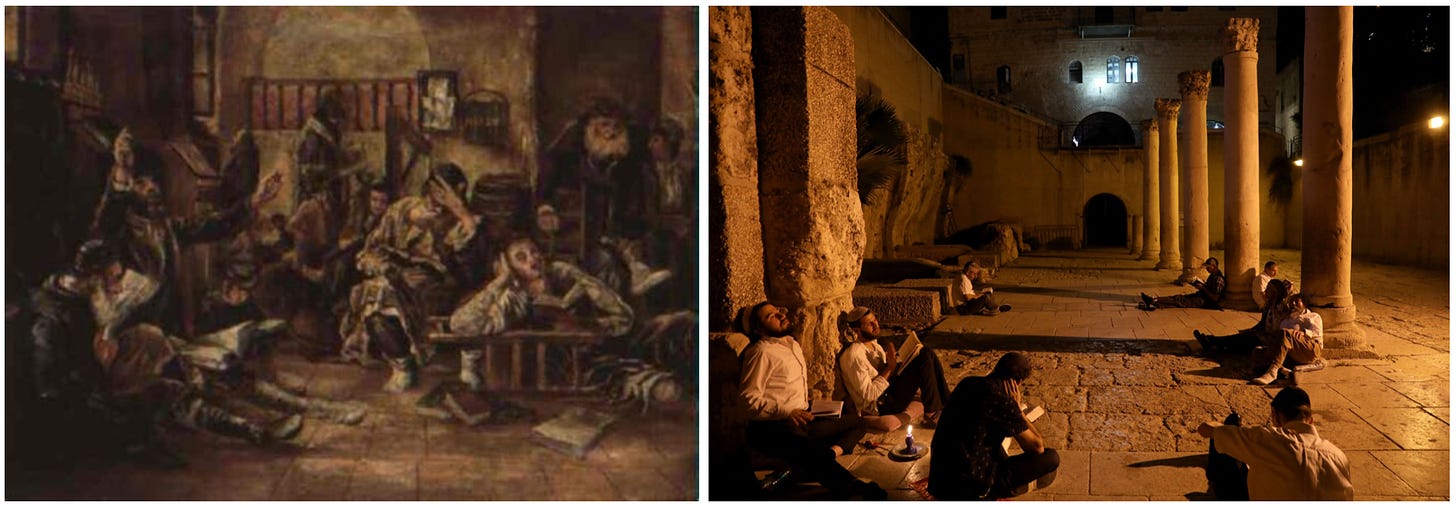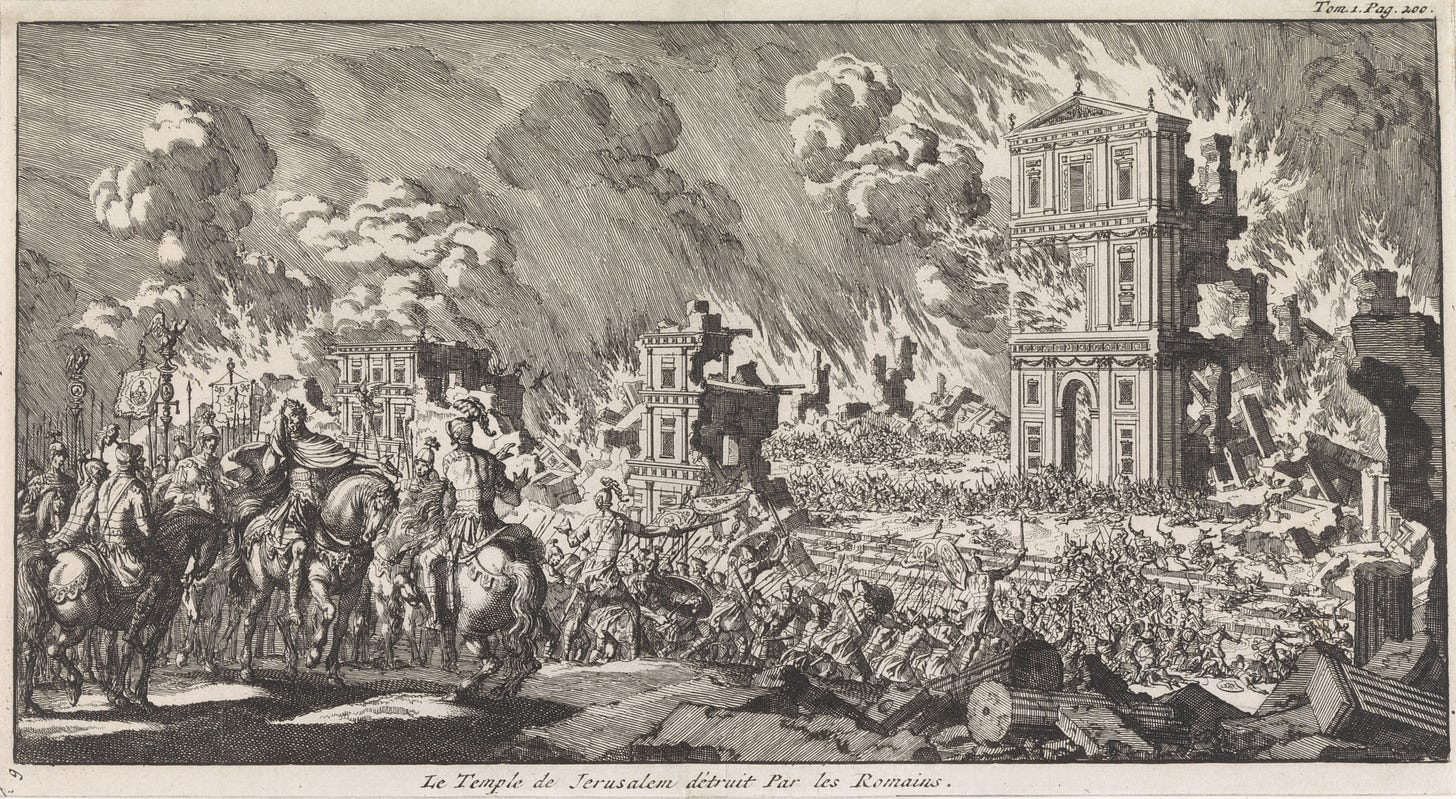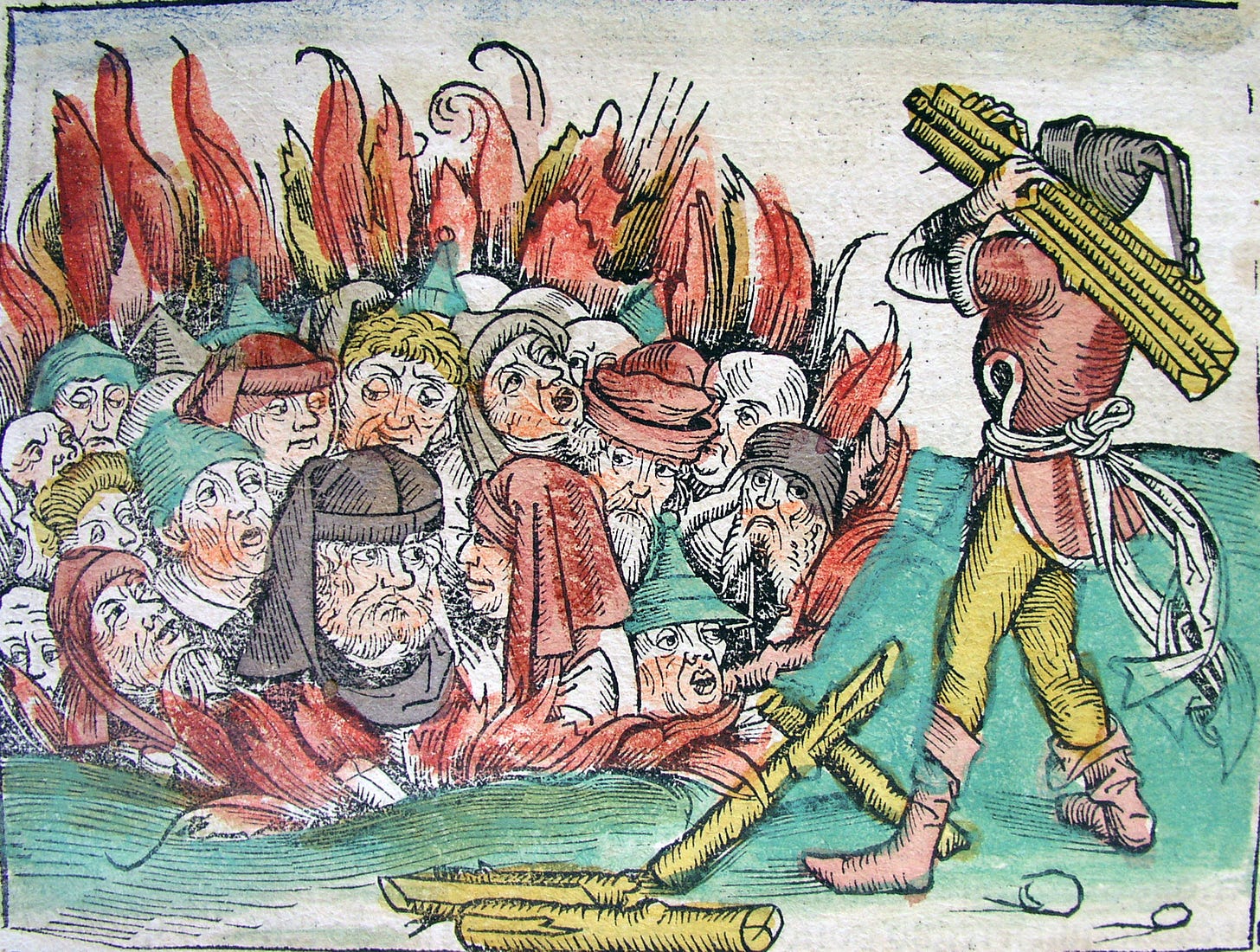Edited by David Swanson
It’s a harsh thing, but a gracious thing, to have a single day to mourn three thousand years of violent loss. In high summer, every year and in every place Jews live, there is a time of imposed and sacred privation, of fasting and ashes, while the moon waxes fat and gibbous, and then the sun pulses with a fierce, oblitering heat. The Ninth of Av—Tisha B’Av in Hebrew—is, foremost, a day to mourn the destruction of the First and Second Temples in Jerusalem, millennia ago. But as the years and then the centuries have crept on, other sorrows have supplemented this most solemn day: mourning for pogroms, for the small and large acts of genocide that scoured swathes of the Jewish people in exile.
Grief so large has no fixed anniversary; if we spent each anniversary of slaughter in mourning, there would be no days for joy. And so, for a time, the people give themselves over to the anguish of millennia, allow themselves to long for a restoration of better times, and pause all of life to give over to a time of weeping. It is a strange day that commences with the eating of ashes. But it is also a gift, in its own stern way.
For the last two years, I have been thinking about the strange cognitive dissonance imposed on us by our country: after the massive upheaval of the arrival of the pandemic, the fear, the trauma, and the waves of death, which continue on in their muted fashion, there has been no time to pause and indulge in memory. There is, in fact, strong disincentive to rest, or to appear to rest, or to struggle in the grip of remembrance: every pressure a society can exert forces us forward with a smile tight on our faces, and permits no pause and no sorrow. There is no anniversary for Covid-19—no date it concretely began, and certainly no date where it ended, because it hasn’t, and maybe it never will. That uncertainty is its own pain: how do you grieve without an anniversary?
This year, the Jewish day of mourning fell on Sunday, a day of mourning for loss on any day, in any year. It is an enforced pause, preceded by a time of contemplation. I think about it, and I wonder how much this country could benefit from being allowed, for a brief time, to let ourselves feel our dread and our loss, to keen it out, and, having felt it to its fullest, to continue on with lessened burdens. The mourning rituals of the Ninth of Av are ancient, and specific to one people, but this year as I listened to the pained and acrid poetry of the Book of Lamentations I felt it as a gift, as I had never felt it before.

The month of Av, on the Hebrew calendar, is a somber one: coinciding sometimes with July, and sometimes August, as the Jewish lunar calendar sways in and out of alignment with Gregorian reckoning, it is always a time of woe. Like Jewish mourning customs as a whole, the public grief associated with Av comes in stages: concentric rings of expressed sorrow. First, there are the Three Weeks, which consume much of the preceding month of Tammuz, and in these days, the prohibitions mourning demands descend on all who observe them. It starts on the seventeenth of Tammuz, the day of fasting that commemorates when the Romans first breached the walls of Jerusalem in their quest to destroy the Second Temple, nearly two thousand years ago.
Jewish mourning is always sequential, and limned by prohibitions—against public expressions of joy, and private comforts. The loss of a close relative is met with a descent: seven days of purest mourning, the fiercely confining vigil of the shiva; thirty days of gentler mourning, though one may not cut one’s nails or hair, or marry; and a year of saying the Mourner’s Prayer, and being barred from public celebrations. Public grieving in the month of Av follows an opposite path: it is an escalation, a crescendo of mourning until its fierce conclusion. The first sequence, the Three Weeks, carries with it the gentlest of the proscriptions. There are no weddings held. It is forbidden to shave, or cut one’s hair, or purchase new clothes. It is forbidden to listen to music, or to play it: this is the time when public expressions of joy and the self-affirmation of grooming is suspended.
After the Three Weeks come the Nine Days, a time for graver lamentations. To the earlier prohibitions are added others: the wearing of freshly laundered clothing, the planting of trees, the cutting of nails, swimming for pleasure, eating meat and drinking wine. The blessing of the new moon is postponed. This daily procession commemorates the Roman destruction of Temple—its sacred possessions carried off as plunder, the priests slaughtered, its ruins left to the depredations of wild beasts, and citizens enslaved by empire as once they had been by Babylon. Finally, the last day of mourning falls, which is the harshest, and the saddest, and most capacious, holding in its small count of hours millennia of varied tragedies.
Tisha B’Av is a holiday of collective remembrance, and it is observed, in the way of Jewish holidays, for twenty-five hours, from sunset on the eve to the hour after sunset on the day itself. At twilight, a final meal is eaten: an egg—symbolizing both mourning and the ever-renewing cycle of life—is dipped in ashes, and eaten while seated on the ground. No food or water is consumed until starlight emerges on the following night. No one may wear shoes of leather, or have sex of any kind, or bathe, or exchange greetings, or sit except on the ground or a low stool, for this is the day the Temple fell, and a day to remember all the sorrow that came in the centuries after to the people who worshipped there. It has become a folk tradition that all the greatest woes of Israel fell during these accursed summer days, the destruction of the First and Second Temples, and all that came thereafter in the long exile.
The Sword and the Sandwich is a newsletter about serious extremism and equally serious sandwiches. Please consider supporting this work with a paid subscription:
On the Ninth of Av is read Eichah, the book of Lamentations, which the prophet Jeremiah wrote in his desolation at witnessing the destruction of Jerusalem. None of the usual honors and blessings are bestowed on those who read its five chapters. The book has its own ancient liturgy—the Torah is chanted in public to the music of the cantillation marks, ancient, runic indications of how the voice should rise and fall, pitched in grief for Lamentations, or joyfully for the Book of Esther, or clear and pedagogic for the Pentateuch. The congregation sits on the floor of the synagogue, and I remember as a child that the sanctuary was dim as the keening voices of the cantors rose and fell. And after Lamentations, we sang the other songs of pain, the dirges of the centuries: kinot.
There are many kinot, and most are anonymous; many are dedicated to the destruction of the Temple, but many, too, are dedicated to collective loss and pain far from the Temple Mount, and long into exile. They are read with a call-and-response of woe, repeated by the congregation, and there is power in the sitting and the repeated refrains. One kinah mourns the public mass burning of books of the Talmud in France in 1242. There are the kinot of the First Crusade—from 1096, when the Jewish communities of the Rhineland, in Mainz, Worms and Speyer, were decimated by the Pope’s own zealots in their thousands. In Kinah 25, by Kalonymous ben Yehuda of Speyer, nine-hundred-year-old agony explodes in an ecstasy of grief. Of the slaughter of the Jews of the Rhineland, he writes:
“I will take myself to the fields,
and others of bitter heart will weep with me
for the beautiful maidens and gentle boys
who were wrapped in their schoolbooks and ushered to the slaughter.
Their bodies, brighter than rubies, than sapphire or turquoise
Were cast out and slung like mire on the streets.”
Kalonymous laments that he cannot add another day of mourning to the Hebrew calendar, and must encompass his own sorrow in the collective mourning of Tisha B’Av:
“For there is no adding a date of breaking and burning,
And the past cannot be preceded,
So on this day I will awaken my grief:
I will mourn and lament and weep with a bitter soul,
And sigh heavily from morning until evening,
For the house of Israel and for the people of God who fell by the sword.”
(Adaption of a translation by Jonathan Sacks of Kinnah 25)
There was no single day on which the slaughters of 1096 occurred, nor every depredation that followed in its wake, the many thousands of smaller slaughters that preceded the great slaughter that devoured the Jews of Europe. Instead, Tisha B’av gathers like bitter water all the pain of the people in exile for two thousand years, and in the eating of ash, and the thirst of the fasting, and the clawing lament of Jeremiah, it offers its own kind of release.
All of us bear our own griefs so separately in this country: those who die of a plague that steals a million from us, or who die in a hail of bullets in their schools or mosques or playgrounds or malls or movie theaters, or who are killed by hatred. In the end each family mourns alone, raises the money for funeral expenses alone, in their own houses of separate grief. Jeremiah laments each category of loss: the young and the old, male and female, mothers and children, widows and orphans. One verse might touch the devastation of the aged that has characterized the plague in our country: “The elders have ceased from the gate”—where once they gathered and told tales and taught.
But it is Chapter 3, the bitterest and most personal section of Lamentations, where Jeremiah bares his own terrible rage, that offers up a brief sense of the value of this kind of devouring memorial, this outpouring. The prophet says:
My soul hath them still in remembrance, and is bowed down within me.
This I recall to my mind, therefore have I hope.
Without the cessation of grief, without the conscious and careful keeping of even the cruelest memory, without the formal privation of mourning and the dirges that mark its ascent, how can we have hope? It is a true recognition of what is lost that allows us to yearn for better, for a restoration. I imagine a day for those lost to plague, and a day for those lost to bullets, and the writing of our own new, true elegies for this time and this place, and the call and response they engender, filling the dimmed hall with grief, and finally the release of grief. I imagine that my country takes the wisdom of my people and draws the poison out from itself. Today, after the great day of mourning, we rise up from our low stools, and eat our fill. After fasting, satiation; after sorrow, recollection in tranquility, and the possibility of joy.








Beautifully stated. We currently are traveling in Portugal, where Maimonides and the Jewish community flourished under the Moors, and then expelled, tortured and massacred a little less than a century later. The Jewish population here is tiny, but the memory of the past lingers, with memorials in Lisbon and Porto. I really welcome your posts.
Beautiful. Thank you.